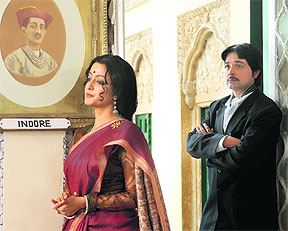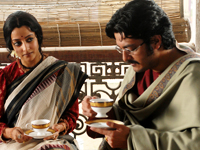There are broadly two types of contemporary ‘art-house’ Bengali films –
a) Period films set in the past
b) Films set in the present but the characters and the setting smelling primarily of nostalgia.
Most recent Bengali films fall in either of the two categories. 2011 being Noble-laureate litterateur Rabindranath Tagore’s 150th birth year, there has been a flurry of films on Tagore’s stories. Rituparno Ghosh is an avid Tagore admirer and had previously made a reasonably successful Chokher Bali(2003). That he will be interested to pay homage to Tagore on this special occasion is not a surprise. It’s quite commendable to get Subhas Ghai to produce the film as well. Rituparno has also roped in the Sen-sisters for the first time – Raima and Riya to play the two sides of the proverbial coin.
But Despite all this, Noukadubi (Boat wreck, 2011) is a decently unimpressive film. Rituparno tried to play a bit with self-reflexivity by announcing his film as an “inspiration” derived from the Tagore novel. He then starts his film with a Tagore song and showing a Tagore portrait being looked at by the heroine. This interplay with the form could have been important had not been used just for the sake of using Tagore’s songs liberally in the film. Now if something is good, then why not use it? But the problem lies in over-use.
These days the curiosity about Tagore’s stories has a psychoanalytical tinge. The weaving of incidents has become redundant. The ultimate psychological question associated with this story is, if the faith of a woman rooted in the everlastingness of her marriage, deep enough for her to break free from the spell of her first love (now a part of her subconscious)? But such questions do not have a universal answer.
However if one reads Rituparno’s reasons for adapting this Tagore story, this is what he says, “I felt that Noukadubi, would give to Bengali cinema, a film with a strong narrative. In recent times, it has become a fad to think that breaking the narrative is the only way of making good cinema in Bengal.” (http://articles.timesofindia.indiatimes.com/2010-11-17/news-interviews/28220684_1_noukadubi-rituparno-ghosh-international-film-festival)
The problem with the Ghosh film is primarily in this narrative membrane (he forwarded the time of his drama by many decades as well). The story is melodramatic and the basis of the wife-swapping saga was primarily a psycho-analytical quest. In this quest, Tagore wove dialogues, situations and a slowly unfolding story.
Now, by narrating this in 2011 and making the film completely asexual , the director is treading a difficult path. He probably got away with the actual sequence of the boat wreck with background reference of the devastation. However the wrecks within are insipid in depiction. Even if we understand Ramesh’s (Jishu Sengupta) sense of binding obligation in front of Sushila’s (Riya Sen) widowed mother, we don’t fathom his reactions towards Hemnalini (Raima Sen) who he planned to marry without letting her know that he was already married. Similarly, Hem’s attraction for Nalinaksha (Prosenjit Chatterjee) in Benares and then moving back to Ramesh seem too staged.
There were few moments where the camera wants to light up the hearts of the audience – especially the one in Benares where Hem and Nalinaksha hold hands to pass through a “dark” lane (these obvious connotations cease to work now, unfortunately) or Ramesh’s confrontation with his father on the subject of his marriage. Unfortunately for Bengali cinema all these seem so borrowed from Ray’s films – Devi, Apur Sansar and may be few others. But even with these nostalgic implicit referrals, the film cannot be saved from itself.
And there is the typical style of acting whenever a Tagore story is shot– slow movements, grim and deep dialogue throwing punctuated with long pauses. Film-makers taking up Tagore should understand that this decorum itself is self-defeating. They can always look up to Ray’s adaptations which were always so natural, so real and close to life.
Amitava Nag edits cinema magazine Silhouette and writes extensively on cinema. His first book of essays ‘Reading the Silhouette: Collection of writings on selected Indian films‘ (LAP LAMBERT Academic Publishing, ISBN-10: 3838396189) was published in 2010. Amitava also writes poems and short fiction in English and Bengali. Amitava works in a software company but dreams of making his own film one day.








A short , yet a very introspective piece. In most of Nag’s critique on cinema , his penchant for focusing on the essentials & quintessentials always draw readers like me. One of the most interesting trait of Mr nag’s review is that , he hardly sets his analytical eye in a Film within. Rather , he prefer to look at a film from outside , from a evolutionary plane ,, , which reflects changes- culturally , historically & in terms of social mileu ,, which , a Film Director is always a part of..